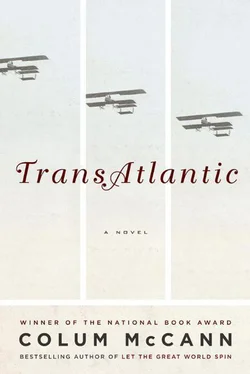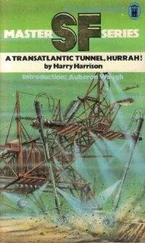THE CANTEEN WORKERS finish at ten in the evening, but then his own staff trundle downstairs to light the stove, boil the water, stir the leaves. He will lift and pour, lift and pour. This whole memory, it will taste of tea.
THERE IS A swerve to Blair. The neat suit, the tie. A dishevelment to Ahern. A busy grief. Both of them sweeping in, taking over their offices. Second floor. Third floor. Meeting after meeting. Phone call after phone call. Blair says to him that he feels as if he is entering a caisson. The pressure slowly building. Beginning to swell. A common feeling, that, but what is the word for it? There is, surely, a word for it, a phrase. The Senator cannot recall. So tired now. The ache in his shoulders. Searching for the word, but he cannot find it.
FOUR IN THE morning. Blair’s office. The desk neat and meticulous. A pen balanced on the rim of a coffee cup. The Prime Minister’s shirt open to the second button. They are stuck now on a point of language. The British and their words. The Irish and their endless meanings. How did such a small sea ever come between them?
He watches Blair run his hands through his hair. Strange, that. The Prime Minister’s hair is wet. And the cheeks are glistening. Somehow freshly shaved? Did he manage a shower? Where, then, and how? Surely there is no shower in the building? There cannot be. All these months he has been here, the Senator has never seen one, nor heard of one. No need, back then, with hotel rooms. But a shower? He craves one now. Just the idea. The pourdown. The cleansing. He should ask straight out, but, then again, there is the matter of decorum. Etiquette. Impolite, probably, to tread upon the personal with the Prime Minister? Focus now. Focus. The issue is prisoners. And remand. And language. Eight hundred years of history. How is it now that they can manipulate the words? What is the right way to force the Unionist hand? Will Adams play along? Can Ahern have a word in McGuinness’s ear? What last words? Where is Hume? There is a leak of light, still, from under Trimble’s door. The intrusion of the ordinary. Tired. So very tired. He still cannot shake the idea that Blair’s hair is wet.
He leaves Blair’s office at five forty-five, and at six in the morning, he sends his staff searching. They arrive back, triumphant. There is indeed a shower. Unknown to them all this time. On the third floor. The only one in the building. Incredible, really. A closet hardly big enough to step inside. The Senator goes upstairs, undresses, steps in, leans his head against the tile. Slick and grimy. He doesn’t care. The water pounds down upon his shoulders. Warm and hard against his face. A caisson indeed. The bends . That’s it. That’s the phrase he was looking for. The bends.
He dries himself off with his shirt and walks out into the corridor, a little bounce in his step, his socks wet from where he has padded on the floor.
EARLY ON GOOD Friday afternoon Gerald hands him an envelope. He unfolds the sheet of paper. Sits back in his chair. He had forgotten altogether. Well, there you have it. The Sox. Bottom of the ninth.
He hears a cheer from downstairs, an applause along the corridor, as if the whole country has heard the news.
A FEW TAPS on the pane make him turn. It is lightly raining outside. Falling diagonally against the glass, catching a moment, as if surprised to be stopped. Rolling downwards. Accumulating and dropping farther. He crosses the room and leans across to lift the latch, opens the window wide. Damp air enters the office. Sounds from the street. A beeping of car horns. A cheer from the front gates. A distant sound of traffic and then a silence. He would like to hold this moment, suspend it, to surround himself with only this, to be bounded by it. He leans his hands against the frame. The small touch of rain against his wrist.
The Senator hears the ringing of the telephone and a gentle knocking on the door, slowly more insistent.
The cheers along the corridor growing louder.
He leans his palms against the window. Perhaps to contemplate such happiness is to diminish it. Sixty-one children. He knows, now, that there will be an ordinariness to that he will return to, other days of tedium and loss, and the Troubles will most likely crash into him from behind, when he least expects it, but for now, for the very briefest moment, this suspended instance, the impossible has happened.
The Senator touches his head against the cool of the glass.
— Come in, he says.
HE LEAVES FOR the airport at dawn on Easter Sunday morning. A bright day. As if it were designed for this somehow. He emerges from the Culloden Hotel, down the stone steps, towards the car. The tiredness in his eyes, his jaw, his shoulders. His whole body belonging elsewhere.
A helicopter hovers on the skyline. The distant trees sway. Fragments of white cloud slide on a layered blue sky.
A couple of journalists wait for him in the driveway of the hotel. The Irish Times. The Independent. Die Zeit. Le Figaro . They are already calling it the Good Friday Accords. He wanders over. Hands in his pockets. Still wearing his blue suit, but his shirt open, the small vee of sunburn at his neck, the rest a paleness. He has only ten minutes. He knows their trade: they will want to talk to him one on one. Fintan. Dirk. Lara. Dominique. Always their first names. He walks along the gravel, side by side. The gray dust scuffing his shoes. He is astounded by the calm of his answers. Yes, we must maintain a sense of composure. The real work is only just beginning. I am quietly optimistic. Hopeful in fact. We sensed all along that something could be achieved. We turn it over now to the people of the North and South. The true nature of a democracy is its ability to say yes when even the powerful say no. There were times when I thought we were teetering on the edge.
He would like for a moment to tell one of the journalists that there was a giddiness in the hallways of Stormont, that he could hear the champagne corks being popped downstairs in the canteen, that he leaned his head against the shower stall and wept with joy. Still, there is decorum to maintain. A need for parsimony. A careful tread. We have all been caught out before.
The true verdict, he says, will belong to history. The ordinary people own it now. We could not have found peace unless the desire for it was already here. Nothing could have been achieved unless it was, first, wanted. The collaboration was across the board. No, it doesn’t take courage to shoot a policeman in the back of the head. What takes courage is to compete in the arena of democracy. But let’s not pretend it’s finished. Yet let’s not pretend that it has only just begun either. It was not an expectation, no. It was a conviction. Generations of mothers will understand this. I do not find it sentimental at all, no, never, not that. Cynicism is easy. An optimist is a braver cynic.
A catch in his voice now. Think about it, he says. It’s simple enough. We’re forced to change because we’re forced to remember. And we’re forced to remember when we’re forced to confront. Sixty-one children.
He watches the hovering helicopter. It dips sideways an instant, disappears behind the angle of the treetops. He feels a dull thump in his chest, but the sound of the rotors dwindles and the helicopter turns and fades off.
The journalists thank him. Shake his hand. He makes his way across to Gerald who leans against the car, grinning ever so slightly. The driver has a sheet in his hand. The Senator takes it, tucks it away. He will leave it for the plane.
The car rattles out onto the road. The blur of green hedges. The distant warehouses. The rooflines. The flags. The skirling flutes, the bright sashes, the echo of the lambeg drums. Enough now. The crossed armalite, the morose songs, the black berets. Gone, all gone. Whosoever brought me here is going to have to take me home.
Читать дальше












